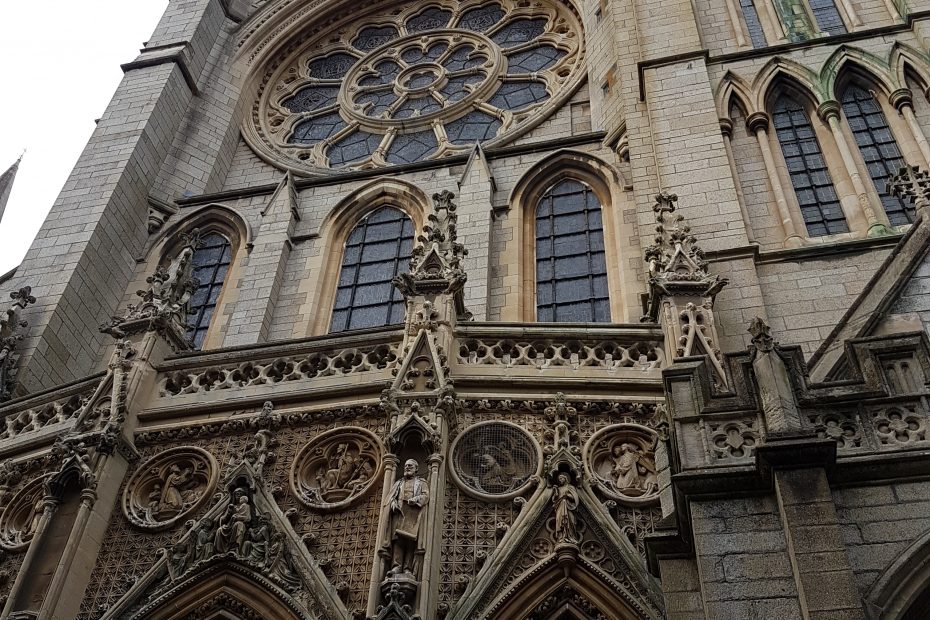I have spent the last week trying to empty my mind of work and so writing my blog now seems more difficult in some ways. However, as I walked through the shockingly busy streets of Truro this week, I couldn’t help looking up at that great cathedral spire and thinking about when I was last supposed to be in the building singing with The Sixteen. I was supposed to be singing there on 5th June, which also happened to be my birthday. I would have enjoyed the usual things I liked when coming to Truro and especially the ‘traditional’ curry in the Kathmandu Palace after the concert. But like so many things this year, it didn’t happen.
This week I also read an article about the plight of cathedral choirs written by Richard Morrison who interviewed my own Sixteen ‘boss’, Harry Christophers. The article talks about how we can support cathedral choirs and choir schools and the need to reach out to state schools. This prompted me to consider my own history of singing in church.
My church singing ‘career’ started when I was about eight years old. I can’t quite remember how it happened, but I think it was in assembly in my primary school, Howe Dell, where they asked for boys to join the local Hatfield Parish Church choir. Up to this point in my life I can barely remember even existing. I was the seventh of seven boys of Eve and Ed Berridge. My dad was a mechanic who went to bingo five nights a week and my mum was a delivery lady for the local dry cleaners. Mum had insisted I take piano lessons with Mrs Smith, the local inflictor of misery. I didn’t survive in lessons long, as the pain of being hit on the knuckles for playing a wrong note as I tried to read the music through my tears had left me with a dread of things musical. However, something happened that day in assembly that really did get me started on singing. Maybe it was the encouragement from a boy called Tom whose dad was a local architect and came from a family of organ builders. I don’t remember, but Tom and I both became regulars in St Etheldreda’s choir, Hatfield as well as good friends.
At one point I had to make a choice though; Tuesday Cubs, where I had been bullied by one of the older boys and was paying my ‘subs’ for the privilege, or Tuesday choir practice where I got paid and could earn a good deal more from singing at various weddings at the weekends. More importantly, I had found something that I seemed to be good at and without my realising, people had recognised that I was more than just the seventh son of the Berridges. So, there it began. And, as a bonus, my soon to be secondary school head teacher was also in the congregation and again, unknown to me, had recognised my talent.
Like many, I drifted from Church in my mid teens. It wasn’t until I was a choral scholar at Trinity College, Cambridge that I found myself in the choir stalls again. After Cambridge there was a year at the Temple Church in London and then less than a year as a ‘lay clerk’ at St George’s Chapel, Windsor Castle in 1985. This however came to an abrupt end in November 1985. Ironically, I had decided to become a committed Christian, instead of a paid singer. I joined the Church of Jesus Christ of Latter-Day Saints. Unfortunately, this didn’t go down well with the then Canon of St George’s. He felt that it wasn’t the right kind of church and gave me the option of leaving my church or leaving Windsor. I have never wanted to be told what to do, especially when I thought I was doing something good for a change and so I left Windsor. Since then I have sung many services at various cathedrals and churches as a deputy, but I have never sung in a paid church choir as a regular.
So what is my point? My point is that over the years most of my singing colleagues have been ex-choristers from Cathedral schools or have attended private schools which have often had a chapel choir at the centre of the school. On the flip side, I have taught singing and conducted choirs in many state schools and have often wished that there was more time and money invested to help develop the musical talents of the students. There is an inequality of access to singing and it isn’t just about the money. I don’t like it and I don’t know what the answer is. However, I do know that if this Government really does believe in a meritocratic society, as it has spoken about on a number of occasions, when it comes to singing the real work needs to be done in local churches and state schools. This means that in all schools, time needs to be made for creative activities in the curriculum and in churches there needs to be room for traditional choirs where children have an opportunity to develop valuable musical skills instead of making all singing worship based on contemporary popular music .
As it stands at the moment, collective singing and singing worship is pretty much banned except for a few professional singing groups. We are all waiting eagerly, while hoping that Declan Costello’s research into aerosol infection through singing will show that collective singing has little more risk than going to the pub, or being overtaken on a narrow footpath by a panting jogger. But whatever, we also need to consider what we think is worth keeping in our cathedrals and churches and what could be better for singing in our schools. And more importantly, what opportunities we want to leave possible for future generations.
